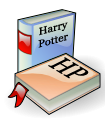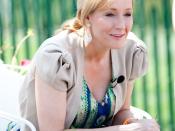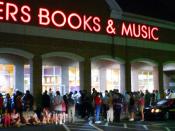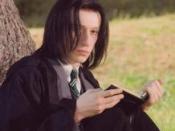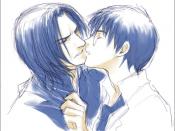Harry Potter Literature that children are exposed to often gives them ideas and provokes them to think and draw their own conclusions about things, it also provides a necessary escape from reality for them. This is why censoring children's books can be rather destructive to their developing minds. If the tools with which kids are given to sharpen their minds are banned, then a little part of their education is stolen from them. With every theft of knowledge the future is too robbed of possibility, and these days books are being pulled off of school shelves faster than ever. "From 1991 to 1994 the number of formal demands for the removal of books from public and school libraries has increased by more than fifty percent (Staples, 1)." At this rate America's libraries will soon have devastatingly small children's sections without any real literary content. Without people in our society who can think and react for themselves than things cannot change, whether the change is for the best or the worst, life would become very repetitive.
Parents are not alone in the battle against questionable reading material. There are many religious groups who make it their personal mission to rid America's libraries of books they see as damaging. One such group is the Christian Coalition and Citizens for Excellence in Education, who print lists with intentions of censoring the books on them. What is it in children's books that adults find so threatening? Parents often object to strong or degrading words and names, or ideas and events that promote satanic, anti-Christian, and witchcraft themes. Although these words and beliefs are something that nobody would want their child partaking in, it helps them distinguish right from wrong, and shows them the strength that such beliefs and words can hold. Surprisingly many of the books that are being banned, are also considered classic children's novels. Frequently banned titles include The Catcher in the Rye, The Adventures of Huckleberry Finn, and Little Red Riding Hood. These stories include most of the traits that parents and other groups find questionable. The language used and 'frightening' events in the story have gotten the aforementioned stories pulled from many libraries across America. While the language in Harry Potter is neither offensive nor harsh, the story about a young wizard and his adventures at Hogwarts is considered satanic and evil by many adults, and school districts. Although the book does in fact deal with wizardry and sorcery of an unearthly nature, it has very clear characterizations of good and evil.
Many school districts however do not care about good and evil characterizations. Their feeling is that if a certain idea is expressed in a book, the school is responsible for teaching it to that child. The reasons for censoring a book range from having satanic content to anti family values. The censors feel that wizardry is a threat to their children, so in fear of a book they probably have not read, they just decide to ban it, and save the hassle of reviewing it in the school board. Profanity is another major reason that schools are pulling books from the shelves at an alarming rate. Words that are demeaning or considered destructive and the books containing them are a sure target for many of the religious groups who support the censoring of children's literature. Words such as "good god, crap, hell, and Christ" are examples of the type which might face censorship. In actuality a child in an American society hears words such as these more frequently than they read them. At places like school lunchrooms and playgrounds the dialogue is often very hurtful and directed at one's peers. Is all of this because of what a child read in English class? That idea is absurd. The television is a much better place for hearing derogatory comments. Robin Brancato, an author, said about the profanity in her book, these words and what they mean are a true and unavoidable part of life, and that she, as an author, is "interested in portraying life as it really is." Children are not fools. They understand what is going on around them and would simply not buy into a plot that had everybody happily holding hands across the world. Its unnatural, every one in the world has seen conflict, on the national scale and at home. Sexual content also tends to get books pulled off the shelves. Books dealing with homosexuality, and even sexual development are targeted. Daddy's Roommate by Michael Wilhoite is about a boy living with his gay father. While this would be an uncomfortable situation to live in, it does help children be more accepting towards all people. Classic novels such as Huckleberry Finn are also being pulled from the curriculum at many schools because of the use of the word nigger. In Kenosha, Wisconsin, the local school district was asked by a member of the NAACP to have the book "be removed from the school cirriculum because of the term 'nigger' (Miner, 7)." Basically what the review board in Kenosha decided was that if the individual teacher was not comfortable with reading the book in class than they could chose an alternative. Although this is a very derogatory word, the novel is a classic one. Almost everybody has read it at one time or another. Almost⦠A few people that might have missed this timeless classic however might be some devout born again Christians. Groups such as the Christian Coalition, and The Committee for Excellence in Education often recommend that books be banned. Other groups include Concerned Women for America, the American Family Association, and The Family Research Council (Miner, 4). These groups object to Harry Potter and other books for mainly religious reasons. A spokesperson for another religious group, Focus on the Family, said that Harry Potter was just "pagan material- witches and warlocks and spells and seances and this kind of stuffâ¦This is about what's right and wrong and pushing religious symbolism (Terwilliger, 2)." Although no where in Rowling's novel is there any religious symbolism, parents continue to complain. If not about pushing Satanism on their children, than about the morals contained in the book. Karen Jo Gounaud, founder and president of Family Friendly Libraries says about Potter "It's a matter of who has the best magic, not who is overcoming evil with goodâ¦by self sacrificing (2)." The FFL website is full of anti Potter propaganda, saying that kids who read it will become part of the Wicca church. While nothing is impossible, it is doubtful that a child who has read a Harry Potter book will, upon the books completion, begin to sacrifice livestock. Or even start believing in witchcraft for that matter. One of the main draws to the book for children is that it offers them an escape from reality. "It's really fun reading books that take you into a different world (Wilgoren, 5)." The book is a separate world for them and no matter how hard children try, they're not going to be able to cast any spells on people. The only danger that Harry Potter represents is to video game makers, who are losing profit with every page turned.
Between the pages of Rowling's first novel in the Harry Potter series, Harry Potter and the Sorcerers Stone, lies a story with brave heroes and evil villains. Instead of teaching anti-Christian and immoral values, as according to some parents, it teaches that evil sometimes lurks in the least expected places and good can hide much the same. For instance in the end of the novel it is Quirrell who is responsible for letting Voldemort inhabit his body, nobody suspected the quiet, reserved Quirrell to be so hungry for power. Also the suspected villain Professor Snape turns out to be the one who saved Harry's life in the Quiddich match. Another positive message is that studying helps in real life. It is Hermoine who often saves the day with her immense knowledge of magical spells, and characteristics of plants. All of her knowledge comes from having enough self-discipline to study hard and remember things she reads. The religious groups against the novel have focused only on the fact that the book deals with magic, and probably have not bothered reading past the cover. If they had, they would begin to see that many of the values and morals that they hold sacred are shared in Rowling's book. The villainous characters in the book range from the typical school yard bully, Draco Malfoy, to the purely evil Voldemort. Although certain scenes in The Sorcerers Stone are frightening, they tend to deal with fictitious events, such as Qurriell drinking unicorn blood in the dark forest. This and the final encounter with Voldemort were by far the more frightening scenes, but is a child really going to believe that underneath turbans are evil monster heads? Or that there are such things as centaurs? These ideas are almost as crazy as believing that Harry Potter is Satan's medium for access into our world, or that Harry Potter is going to cause a nation of children to join the Wiccan church. With every generation has come some controversial progressions, and this is just one of them. With today's loud music, violence in films and video games, parents should be relieved that their children are turning to books that stir their imaginations, and at the same time strengthen their minds. While most parents are probably ecstatic that their kids are reading anything, it is the few that feel their values are at stake who force teachers and librarians to remove controversial books from the shelves.
